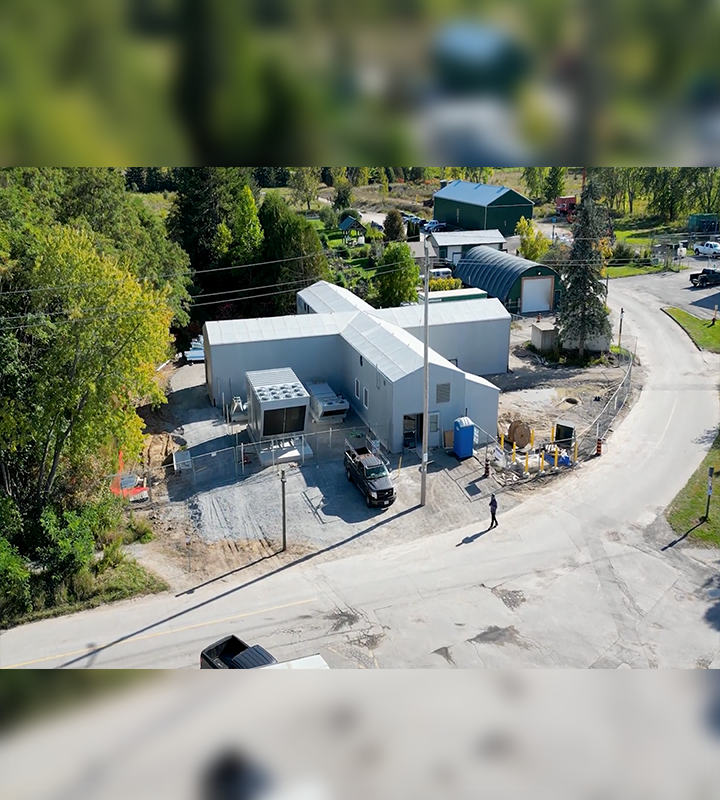- Home »
- Home »
- Programs »
- Aquaculture (Co-op)
Aquaculture (Co-op)
Build your future in one of Canada’s fastest-growing industries with Fleming’s Aquaculture Postgraduate Program.
Program Information
Start Date
September 08, 2026
Domestic Availability
Accepting Applications
International Availability
Closed
CIP Code
01.0303
Program Code
AQU
Delivery
In Person, Co-op
Credential
Ontario College Graduate Certificate
Academic School
Location
Program Contact
Domestic Tuition
per semester*
International Tuition
per semester*
*Domestic tuition amounts shown are from the 2025-2026 academic year and are subject to change.
*International tuition amounts shown are from the 2025-2026 academic year and are subject to change.
Apply Now
Canadian StudentsView Curriculum
This compressed, one-year program is the only Aquaculture program offered as a Post-Graduate Certificate in Ontario. Food aquaculture operations encompass a wide variety of species and culture techniques. In addition to food production, aquaculture activities include production of fish for conservation, and production for ornamental species. The global demand for aquaculture products is growing, along with demands for stewardship, sustainability and food safety and security. This unique program combines:
- Significant hands-on operational experience
- Numerous field trips to experience aspects of the aquaculture industry such as trout farming and conservation stocking
- Business training so that graduates can both promote the industry and understand the diverse challenges facing aquaculture enterprises
During first semester, students will address aquaculture fundamentals. Much of the program will take place in the campus hatchery facilities, which include an Atlantic salmon hatchery and a research hatchery.
The focus in second semester is on operational and business practices, and internship planning.
Final semester is an 8-week, off-site, paid co-op experience, enabling students to specialize in their area of interest.
Please note: In addition to paying tuition and fees for 2 semesters of study, students pay a co-op fee (approximately $558.00) for administrative costs associated with the co-op placement.
The industry is growing in all sectors, including food production, conservation, aquaponics and pond/garden markets. The work is physically demanding and may involve exposure to unfavourable weather conditions. Graduates should be prepared to relocate for employment, and to undertake entry level or contract work initially. With an aging workforce, those who possess strong leadership and communication skills, plus aptitude for mechanical troubleshooting, are prime candidates for promotion into lead hand or supervisory roles.
- Aquaculture is the fastest growing food production activity in the world (UN Food and Agriculture Organization)
- Canada is the 4th largest salmon producing country
- Canadian aquaculture accounts for 14% of total seafood production and 35% of its value
- Perform a variety of aquaculture field skills competently, in accordance with established norms, and in a way that provides leadership and direction for others where required.
- Assess environmental aspects of aquaculture and communicate the results to a variety of stakeholders using current and relevant terminology.
- Recognize and justify the diversity and potential for aquaculture as alternative source of fish protein.
- Monitor and assess fish health and environmental conditions at an aquaculture site.
- Describe and distinguish all life stages and culture techniques of select marine and freshwater species.
- Examine and evaluate the business viability and potential for various aquaculture operations.
- Assess the economic and social viability of specific aquaculture technologies and design.
- Lead and maintain a variety of aquaculture operations, employing the appropriate mechanical and technical skills as required.
- Supervise and evaluate aquaculture field crews in accordance with established protocols.
Students applying to Aquaculture (Co-op) must meet the following requirements:
- Undergraduate degree or Ontario College diploma in a related field or equivalent
OR
Minimum of three years of related industry experience detailed in a professional resume with a letter of intent may be considered
In The News: Aquaculture (Co-op)

Orientation is like a pilot episode of a TV show. You’ll meet a bunch of people, forget half their names, and then slowly figure out what’s going on.
Don’t stress, you’re not alone. Everyone’s winging it just like you are.
First, allow me to introduce myself. My name is Bryce Jones, and I’m enrolled in Fleming College’s Mental Health and Addictions Worker – Social Service Worker Dual Diploma program. I wrote this guide for you because when I finished Orientation at Fleming, I regretted not looking into the events on campus more, so I could be involved from day one.
Here’s what you need to know.
Navigating Campus
Let’s be honest, you’re going to get lost at least once. Fleming is split into four wings: A, B, C, and D. I found it easiest to use the Student Services desk and the bridge between A and B as my main landmarks. Both are near the main entrance, which is probably where you'll come in. If you keep walking through the big open foyer and pass the giant screen, you’re officially in C Wing. It's a bit spread out, but both staircases in that area will lead you to different parts of it. Keep going past the stairs, past Tim Hortons and Pizza Pizza, down a hallway, that’s D Wing. All the beginnings of hallways have signs with the rooms posted; just make sure to look up when entering a new area, and you’ll be okay.
Getting Involved
Talk to strangers (on purpose)
Orientation is one of the few times it’s not weird to introduce yourself to random people. Say “hi” in line, at events, in the hallway. Most friendships start like that here. I made many friends (and I would classify myself as a shy nerd) just by opening up a tiny bit. A simple, “What program are you in?” goes a long way.
How to Study in College
Studying isn’t one-size-fits-all. Here’s how I make it work at Fleming.
Know Your Spaces
- The Library: Quiet floors, study rooms, and long hours. It’s my go-to for getting in “the zone.”
- Peer Tutoring: It’s available for most programs, but be sure to book sessions early (especially around midterms)! Don’t feel silly for asking for help; it’s smart to recognize when you need it.
- Study Rooms: Some wings have open rooms or nooks you can use (C Wing is a goldmine). Just bring headphones.
Study Smarter, Not Longer
- Try the Pomodoro Technique: 25 minutes of studying followed by a 5-minute break on repeat for four intervals before taking a longer break.
- Make playlists or find ambient background noise (my favourite is a lo-fi album released by Sublime!)
- Study with friends and help hold each other accountable.
Where to Eat/Hangout
So, enough about school, let’s talk food and vibes. Whether you're in between classes, cramming for midterms, or just looking for a place to chill, here’s where to go!
On Campus
- Tim Hortons & Pizza Pizza: Great for quick bites, but lines get long around lunch, so plan accordingly.
- The cafeteria: Rotating hot meals, snacks, coffee, and lots of seating. It's a good spot to hang out between classes. There’s also a piano—how fun?!
Off Campus
- Riley’s Pub & Maple Moose are local student pub faves, great for a night out on the town or a quick date.
- Kawartha Dairy on hot days, or NG Saigon Boys if you're craving takeout.
- Need a place to hang downtown? Try Smitty's, great coffee and a cozy study spot.
- Gerti's has a great atmosphere, drinks, service, and food.
- Ghost Taco delivers chef-inspired tacos, and it’s my personal favourite to order right now.
Bonus Tips
- If you plan on using the bus for transportation, download an app called Moovit. It functions like Google Maps, but with more accurate bus times.
- Add MyCampus to your home screen! Click the 3 dots if you’re using Chrome, or if you’re using Safari,?navigate to the website in Safari, tap the share icon (square with an arrow), scroll down, and select "Add to Home Screen”.
My Experience
Each friend I’ve made at Fleming has helped me grow into the person I’ve always wanted to be. There’s something powerful about being surrounded by classmates who are all here to build something better for themselves and their communities. Good luck this fall and make the most of your time here!
Get the inside scoop on campus life, student experiences, and expert tips.
From hidden study spots to career advice, our blog is your go-to source for insights, inspiration, and everything in between. Have an inspiring journey, a unique campus experience, or a success story to share? Submit your blog idea to the Fleming Connect team for your chance to showcase your story to the entire Fleming community.

Looking to gain an edge in your field or pivot to a new one entirely? Fleming College’s post-graduate programs are designed to support you in the next chapter of your career. Whether you're building on your undergraduate degree, returning to school to refine your skills, or applying a credential to the knowledge and experience you've gained in the field, our post-grad certificates and diplomas blend real-world experience with practical, career-focused training.
What is a post-graduate program?
A post-graduate program is designed for students who already hold a college diploma or university degree, and/or have relevant work experience. These programs, which range from two to four semesters, are perfect for those looking to sharpen their skills, specialize in a niche field, or transition into a new career.
Why Choose Fleming?
Fleming College's post-graduate programs are shaped by the needs of the job market and powered by strong community and industry partnerships. Many of our programs include internships, co-ops, or field placements to give you valuable, hands-on experience before you graduate.
You'll also benefit from:
- Access to expert faculty with industry experience;
- Career support, resume help, and job search guidance; and
- A welcoming, supportive learning environment
Explore Fleming’s Post-Graduate Programs
School of Environmental and Natural Resource Sciences
- What you’ll learn about: In addition to food production, you will learn about aquaculture activities, including the production of fish for conservation and production for ornamental species. You’ll also gain valuable experience with zebrafish (a key model species in ecotoxicology and biomedical research).
- Career opportunities: Food Production, Conservation, Aquaponics, and Pond/Garden Markets.
- Duration: 2 semesters
Environmental Land Management – Canadian Context
- What you’ll learn about: Discover how to turn your passion for creating more liveable, sustainable communities into a career in Canada’s environmental sector.
- Career opportunities: Municipal Land Use Planning, Urban Planning, Parks and Recreation Planning, Transit Planning, Environmental Planning, Management Consultancy.
- Duration: 4 semesters
School of Business
- What you’ll learn about: Learn how to design and create software by embedding AI into applications that meet industry needs. Modern software design and AI frameworks, machine learning, and big data fundamentals are the basis of this program.
- Career opportunities: AI Engineer, Programmer, Business Intelligence Developer, Data Analyst, Research Scientist/Engineer, Software Engineer/Architect, Machine Learning Engineer, and more.
- Duration: 2 semesters
- What you’ll learn about: You will learn about various digital tools and technologies, how to create project management frameworks, digital strategies and tactics, and more.
- Career opportunities: Digital Marketing and Communications, Marketing Project Management, Advertising Accounts Management, and Media Coordination.
- Duration: 2 semesters
Haliburton School of Art + Design
Cultural Heritage Conservation and Management
- What you’ll learn: This program prepares you to care for and conserve historical artifacts, with opportunities to work directly with organizations like the Peterborough Museum and Archives.
- Career opportunities: Conservation Assistant, Museum Assistant, Curatorial Assistant, Conservator, Collections Care Coordinator, Museum Registrar, and more.
- Duration: 4 semesters
Museum Management and Curatorship
- What you’ll learn: Develop curatorial and exhibit planning skills while learning the ins and outs of non-profit administration and museum operations. Intern at partner institutions and gain real-world museum experience.
- Career opportunities: Collections Manager, Curator, Digital Content and Marketing Coordinator, Education Officer, Exhibit Designer, Fundraiser, and more.
- Duration: 3 semesters
School of Health and Community Services
Health Care Management – Canadian Context
- What you’ll learn: Learn about health law, policy, human resources, and financial management—preparing you for administrative and coordination roles in hospitals, clinics, and NGOs.
- Career opportunities: Graduates may work in settings such as clinics, hospitals, long-term care facilities, private facilities and home care.
- Duration: 4 semesters
Perioperative Nursing (RN and RPN)
- What you’ll learn: Training covers everything from sterilization and surgical instrumentation to interprofessional communication in high-pressure environments.
- Duration: 1 semester
Community Collaboration in Addictions and Mental Health
- What you’ll learn: You'll explore how professionals collaborate to deliver impactful public services, gaining hands-on experience with inclusive, client-centred strategies that support individuals, families, and communities.
- Career opportunities: Community mental health worker, outreach coordinator, crisis intervention specialist, and more.
- Duration: 2 semesters
How to Apply to a Post-Graduate Program at Fleming College
To enrol in a post-graduate program at Fleming, you’ll need to have a college diploma or university degree from a recognized institution (or, in some cases, a minimum amount of relevant work experience). Some programs may have additional requirements (such as a healthcare license or specific academic background), so be sure to review the admission criteria for your program of interest.
Most applications require:
- Official transcripts
- Resume
- Statement of interest
- (Optional) Letters of recommendation
Application deadlines vary by program. We recommend applying early to secure your spot.
Whether you’re diving deeper into your field or charting a new path, a post-graduate program at Fleming College can help you get there with confidence and purpose.
Get the inside scoop on campus life, student experiences, and expert tips.
From hidden study spots to career advice, our blog is your go-to source for insights, inspiration, and everything in between. Have an inspiring journey, a unique campus experience, or a success story to share? Submit your blog idea to the Fleming Connect team for your chance to showcase your story to the entire Fleming community.

Lindsay, ON – (December 6, 2023) – Fleming College is on the cusp of opening an innovative new fish hatchery which will combine the latest aquaculture technology with hands-on learning, all while enhancing Fleming’s research capabilities.
Construction is underway on a new, $6.5 million facility, located at Fleming College’s Frost Campus in Lindsay, ON. The new facility will open in the spring of 2024.
“This hatchery stands as a testament to Fleming’s commitment to applied learning and fostering groundbreaking discoveries,” said Fleming College President Maureen Adamson. “This facility will serve as an unparalleled educational hub for aspiring students and community partners, pioneering research in aquaculture production.”
Aquaculture is the breeding, raising, and harvesting of fish for human consumption. It is increasingly becoming more relevant as governments and industries look for new ways to feed and supply the world’s population with protein in ethical and sustainable ways.
Joining the long-established Aquaculture program for students, Fleming College launched the Centre for Innovative Aquaculture Production (CIAP) in 2021, an applied research centre working within the commercial and scientific aquaculture community.
Researchers, program faculty and technologists worked side-by-side with students under one roof for the first time in Fleming’s historical teaching hatchery.
In recent years, CIAP has experienced rapid growth. At the same time, the number of Aquaculture program students is expected to double in the next few years, now attracting students from around the globe.
The need for an additional and new learning and research space that could accommodate the needs of both students and researchers quickly became apparent to Fleming College. The College broke ground on the new facility in early 2023.
Boasting three fully independent recirculating aquaculture system-based wings as its foundation, the new facility enables the academic and research teams to vary air and water temperature and lighting conditions to simulate a broad range of climates and regions around the world. This allows for a much broader variety of species to be incorporated into education and research, from traditional cold water, now to more temperate and warm water species.
The original hatchery will remain in operation at the Frost Campus. Working in tandem, the two hatcheries will house multiple cohorts of fish across levels of maturity and species at the same time.
“This new facility, and what our students will learn here, will be increasingly important as the world looks for new food sources and sustainable practices,” Adamson said. “The ability to study warm and cold-water species, and different cohorts of fish, will open up more employment opportunities for our students.”
For researchers, these advantages also translate in much shorter lead times for work with industry enabling them to be even more responsive to partners’ point in time needs.
“This type of facility isn’t built often, and there aren’t many in Canada,” President Adamson said. “Fleming College has made this investment as a testament to our success and commitment to our community and surrounding partners. We are proud of our growing reputation in the Centre for Innovation in Aquaculture Production.”
About Fleming College
Fleming College respectfully acknowledges that we are situated on Michi Saagiig Anishinaabeg lands and territory. Located in the heart of Central Ontario, Fleming College has campus locations in Peterborough, Lindsay, Cobourg and Haliburton. Named for famous Canadian inventor and engineer Sir Sandford Fleming, the college features more than 100 full-time programs in Arts and Heritage, Business, Environmental and Natural Resource Sciences, General Arts and Sciences, Health and Wellness, Justice and Community Development, Skilled Trades and Technology, and Continuing Education. Fleming College has more than 6,800 full-time and 10,000 part-time students, and 80,000 alumni.
For media enquiries, please contact:
Sarah Deeth
Communications Officer
sarah.deeth@flemingcollege.ca
705-749-5530 ext. 1161
Web: flemingcollege.ca
Facebook: facebook.com/flemingcollege
Twitter: @FlemingCollege on Twitter
Instagram: @flemingcollege on Instagram